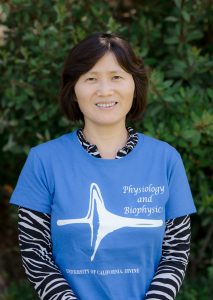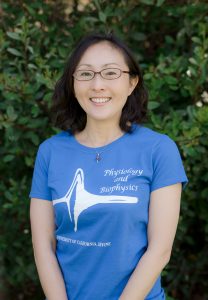Dr. Felgner is Director of the UCI Vaccine Research and Development Center and the Protein Microarray Laboratory and Training Facility. The goal of his current research is to identify the right antigens to use for vaccines. The Laboratory developed a high throughput approach to clone and express all proteins encoded in a microorganism’s genomic DNA and print them onto protein microarrays. The Lab has cloned 70,000 genes derived from 35 infectious microorganisms, expressed and printed the encoded proteins on microarrays and probed with an inventory of more than 25,000 sera from infected, vaccinated, and healthy people worldwide to identify serodiagnostic and vaccine antigens.Dr. Felgner joined the faculty at UC Irvine in 2002 after two decades of experience in the biotechnology industry, including founding Vical Inc. in San Diego based on his discovery of DNA vaccines and serving as Chief Scientific Officer to help build the company into a publicly traded entity. He discovered and developed ‘Lipofection’ DNA transfection technology in 1985, the most widely used approach for introducing nucleic acid into cultured cells. His work has led to 200 published papers and 45 patents that have been cited by other scientists more than 33,000 times, and founding of a UCI startup company Antigen Discovery Inc.
Dr. Liang received her Ph.D. degree in Microbiology and Molecular Virology from Cornell University. She then joined Dr. Bernard Roizman’s (National Academy Member) Viral Oncology lab at University of Chicago to continue her research on Herpesviruses replication and gene therapy and published several peer-reviewed papers on this topic.For the past ten years, she has been studying antibody responses to various infectious diseases using high-throughput protein microarray approach. Her current research focuses on immune responses following infectious disease challenges, especially as they relate to the discovery and development of vaccines and improved diagnostics, through an established collaborative effort with researchers from different universities all over the world. Dr. Liang has been a PI on several subcontract grants, managed numerous projects, and been a leader in developing protein microarrays on a genome-wide scale and characterized antibody responses against different bacterial/viral/parasital pathogens, including Salmonella enterica Typhi, Toxoplasma gondii, Brucella melitensis, Shigella, Clostridium difficile, Orientia tsutsugamushi, Vibrio cholera, Schistosoma, Hookworm, Leptospira interrogans, Rickettsia typhi, Coxiella burnetii, Trypanosomasis cruzi, Cytauxzoon felis, Plasmodium falciparum and vivax, Bartonella henslae, Herpesviruses, Flaviviruses, etc. This systems biology approach provides an empirical basis for understanding the breadth and specificity of the immune response to infectious organisms. She has developed a computational model of proteomic features that predict whether a protein is antigenic and produces antibodies that are serodiagnostic or confer protection. She has published over 30 peer-reviewed papers using the microarray technology.

Algis Jasinskas, Ph.D.
Project Scientist
ajasinsk@uci.edu
Ms. Jiin Felgner is a pharmaceutical scientist specializing in the development of drug products for human clinical use and life-science products for researcher use. She received her BS degree from Pharmacy School of National Taiwan University in 1973 and soon became a certified pharmacist. She further received her MPH degree from the Public Health School of National Taiwan University in 1975, and MS degree from Biochemistry graduate school the University of California, Davis in 1978 to broaden her training.Throughout her long productive career in the biopharmaceutical industry, she has worked in big pharmaceutical companies (including Syntex, Genentech, and TEVA) and startup biotech companies (including Vical, Gene Therapy Systems, and Antigen Discovery Inc). She has successfully developed many pharmaceutical products for human clinical use as a principal scientist or a team lead. The chemical entity of these products ranged from small synthetic molecules, peptides, to large recombinant proteins and plasmid DNA; dosage forms ranged from a liquid, lyophilized, to a complex emulsion, liposome, and suspension. Many of them have been approved by FDA, e.g. Human Gamma Interferon, Tissue Plasminogen Activator, LHRH decapeptide analog, and 15 generic drug products. In addition, she has developed many lines of research products for life science researcher use, including transfection reagents, protein microarrays, ELISA kits, Immunostrips, cloning vector, and competent cells.
She joined UCI as a visiting formulation scientist in 2016, the focus of her research is to develop a biomimetic virus-like particle (VLP) subunit vaccine platform consisting liposomes, emulsions, and polymeric microspheres that can induce a durable immune response after a single injection and prevents infection for at least 1 year.

Rafael Ramiro de Assis, Ph.D.
Project Scientist
rramirod@hs.uci.edu

Jenny Davies, Ph.D.
Project Scientist
jdavies2@uci.edu
Anthony Gregory, Ph.D.
Project Scientist
a.gregory@uci.edu
Andriy Yeromin, Ph.D.
Assistant Project Scientist
ayeromin@uci.edu
Graduate Students
Ray Chiang
Jui-Lin Chiang earned his Pharm.D. at National Taiwan University School of Pharmacy, where he participated in research on vaccine adjuvants and cancer drugs’ modulating of immune cells, conducted by Dr. Ya-Wun Yang, using multicolor flow cytometry. With a background in clinical pharmacology, he discovered the pivotal role of the immune system in human health and, thus, aspired to approach disease treatment from an immunological perspective in the future. to gain a more comprehensive understanding of the immune system, he chose to join the Vaccine Research and Development Center at UCI for his Ph.D. training.
–






